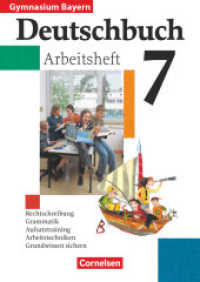Full Description
A major influence on the education of young children since the late nineteenth century, the philosophical and practical tenets of Frobelian early childhood education require urgent re-articulation in light of current debate and developments in research and policy.
This seminal Handbook responds to this need, drawing together a unique and valuable body of literature, research and case studies to make explicit the specific features of Froebelian education and provide key impulses for future research and practice in this area. Chapters present the sometimes divergent perspectives of leading educationalists, and so offer a uniquely comprehensive overview of Froebelian approaches and their interaction with contemporary policies and insights.
The Handbook explores five significant areas of scholarship and practice:
Part I examines the original Froebelian principles and practices in early childhood education in different parts of the world.
Part II presents case studies, development projects and practitioner publications exploring Froebelian approaches to early childhood education.
Part III details research studies which document, debate and evaluate Froebelian approaches.
Part IV considers how Froebelian approaches might be sustained and adapted for use in various cultural contexts across the world.
Part V offers a re-articulation of research and policy.
An essential resource for in-service and future practitioners, researchers and policy-makers involved in early childhood education, this key text will promote discussion, aid analysis and further the practical application of Frobelian principles.
Contents
Part I An examination of the original Froebelian principles and practices in early childhood education in different parts of the world Chapter 1 Friedrich Froebel, his life and ideas. Chapter 2 Tracing Froebel's legacy: The spread of the movement across Europe and beyond and his influence on education. Chapter 3 The life of the Froebel Archive: a story. Chapter 4 Connectedness in Froebel's philosophy: women, parents, community and unity. Chapter 5 Froebel's contributions to early childhood pedagogy. Chapter 6 'Social and conceptual spaces - Froebelian geographies': project for the Froebel Archive collection located at the University of Roehampton. Chapter 7 The psychoanalytic kindergarten project in Soviet Russia 1921-1930. Chapter 8 The transfer, translation and transformation of Froebelian theory and practice: Annie L. Howe and her Glory Kindergarten and Teacher Training College in Kobe Japan 1889-1929. Chapter 9 Froebel is dead; long live Froebel! the National Froebel Foundation and English education. Chapter 10 Working with the 10 principles of early childhood practice: revaluing stories and imagination for children's biliteracy learning in South Africa. Chapter 11 Advocacy and collaboration in the kindergarten movement of Aotearoa New Zealand: some Froebelian legacies. Part II Case studies, development projects and practitioner publications exploring Froebelian approaches to early childhood education. Chapter 12 Elinor Goldschmied (1910-2009): Let the past inform the present! Chapter 13 The Froebel Blockplay Project: reflections from a practitioner researcher twenty five years on. Chapter 14 Froebelian work in South Africa. Chapter 15: The Froebel Trust Kolkata project. Chapter 16 The educational meaning of 'wander' in nature according to the development of early childhood. Chapter 17 Developing creativity in children's musical improvisations. Chapter 18 A story of Froebel's global reach. Chapter 19 A case study at Cowgate Under 5's Centre. Chapter 20 Case study: another time, another place: developing Social Studies in nursery school. Part III Research studies documenting, debating and evaluating Froebelian approaches Chapter 21 Ownership and autonomy in early learning: A brief review of the Froebel Fellowship 2002-15. Chapter 22 Caring for babies and children under three: the contribution of Froebelian principles. Chapter 23 Mother's Songs in daycare for babies. Chapter 24 Living with Children: A Froebelian Appoach to working with Families and Communities. Chapter 25 The Well-Being of babies, children under three and staff leaders in Daycare. Chapter 26 Transnational travelling teachers. Chapter 27 The experiences and pedagogical beliefs , perspectives and practices of students at Froebel College. Chapter 28 Using teacher narratives in early childhood teacher training: history, identity and reflective practice. Chapter 29 How do twenty-first century teacher trainees connect their practice to Froebel's pedagogic principles? A case study of early childhood specialists at the University of Roehampton Froebel College 2011-2015. Part IV Sustaining and handing on the Froebelian approach to early childhood education in ways fit for purpose in a variety of cultural contexts across the world Chapter 30 The Froebel Colleges. Chapter 31 The Froebel Educational Institute: Influential tutors and Froebelian PhD graduates. Chapter 32 Schools with a strong Froebelian influence. Chapter 33 The Froebel Networking tradition and kitchen seminars. Chapter 34 Communities of Froebelian practice: Strawberry runners and the Edinburgh Froebel Network Chapter 35 Froebelian conferences and course and Early Childhood Research Centre (ECRC), University of Roehampton. Chapter 36 Froebelian work at Canterbury Christ Church University. Chapter 37 The International Froebel Society. Chapter 38 From gutter to sand pile: discourses of space and place in interventions in working class children's play. Chapter 39 A Froebelian journey: from Froebel to Froebel. (A reflecting on the Froebel Travelling Tutors pilot course). Part V Re-articulating research and policy Chapter 40 Froebelian chimings with the legally framed early childhood curriculum documents of Great Britain: England, Scotland and Wales. Chapter 41 Froebelian influences on early childhood education and care government policy documents in England. Chapter 42 Re-articulating research and policy Appendix 1 References








